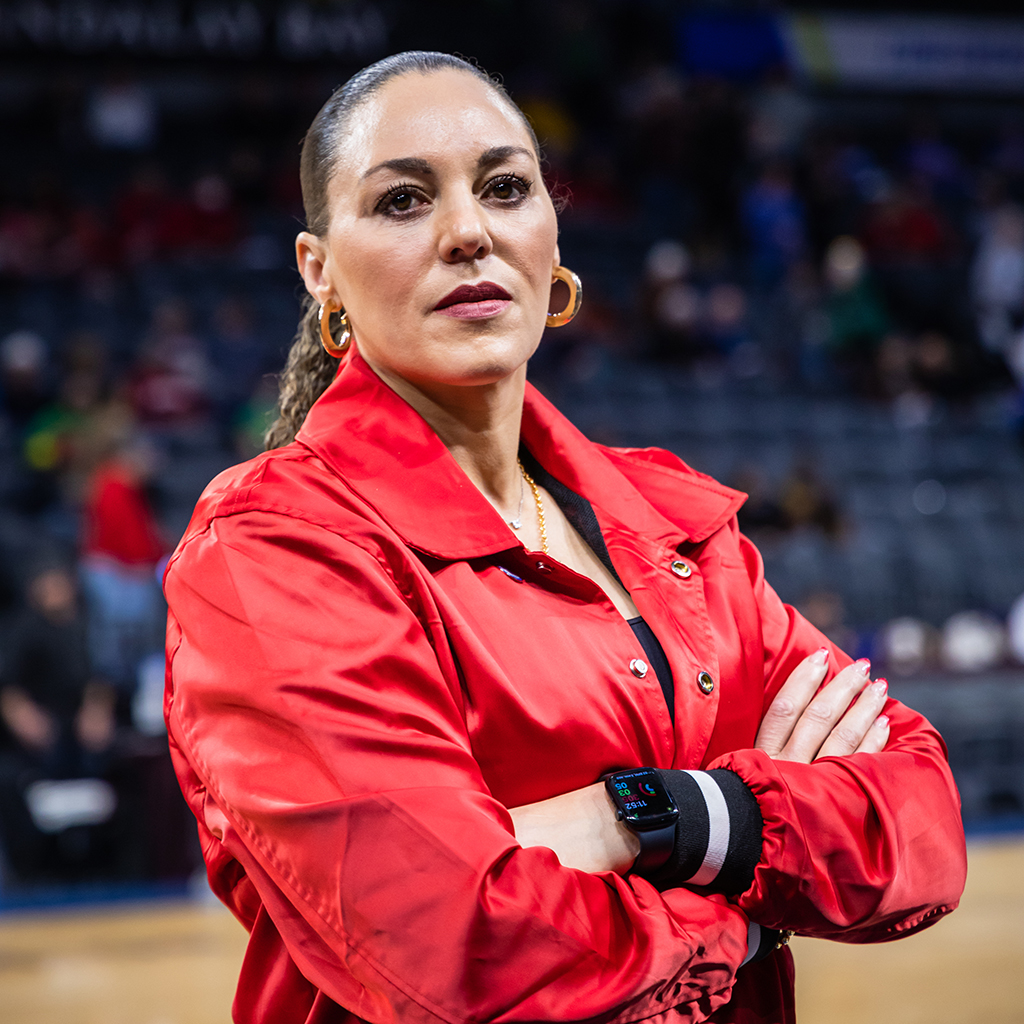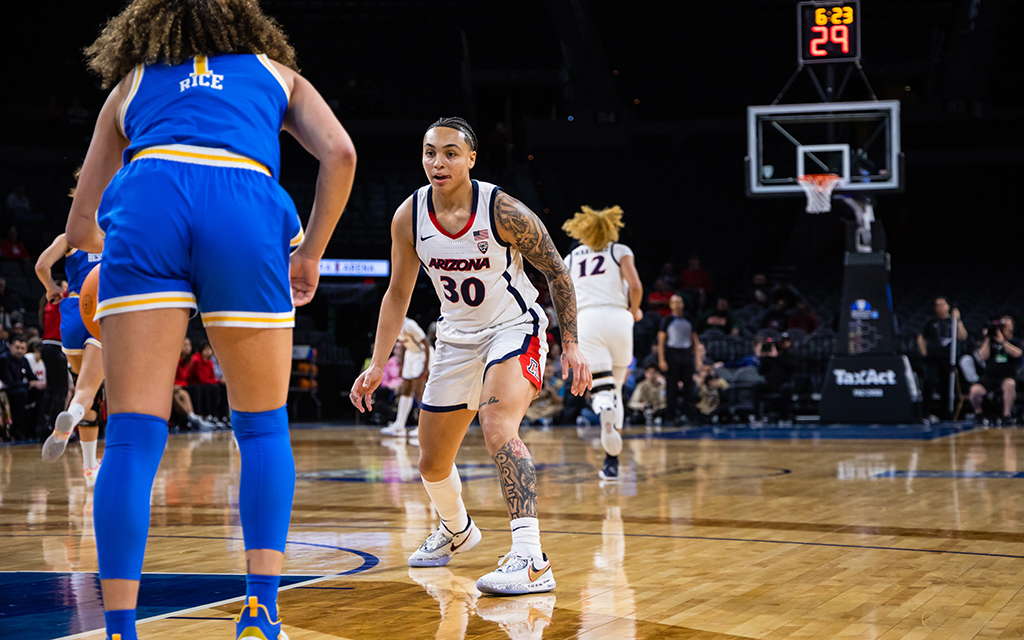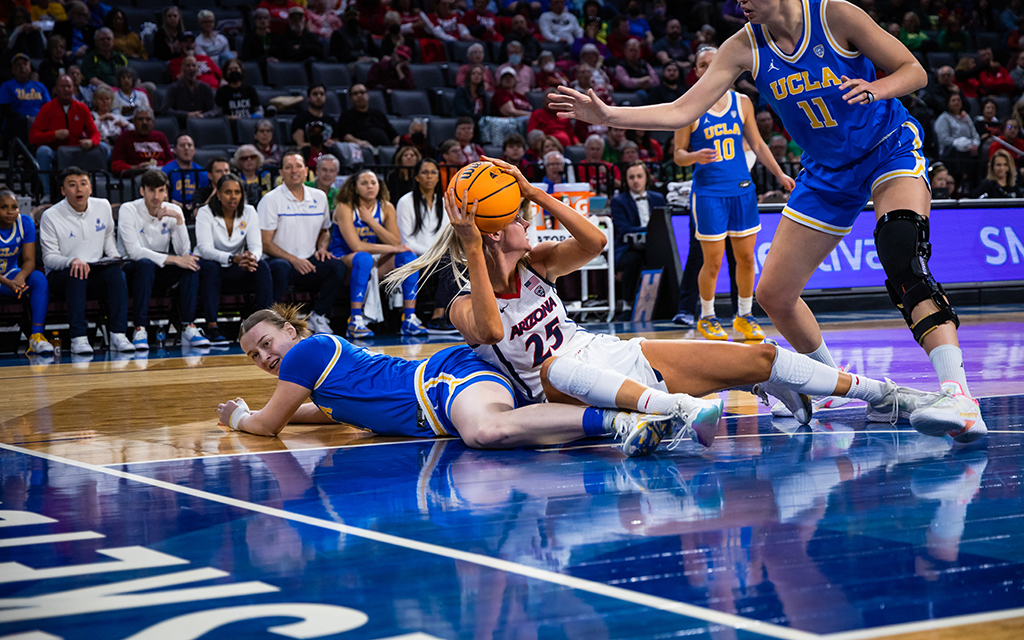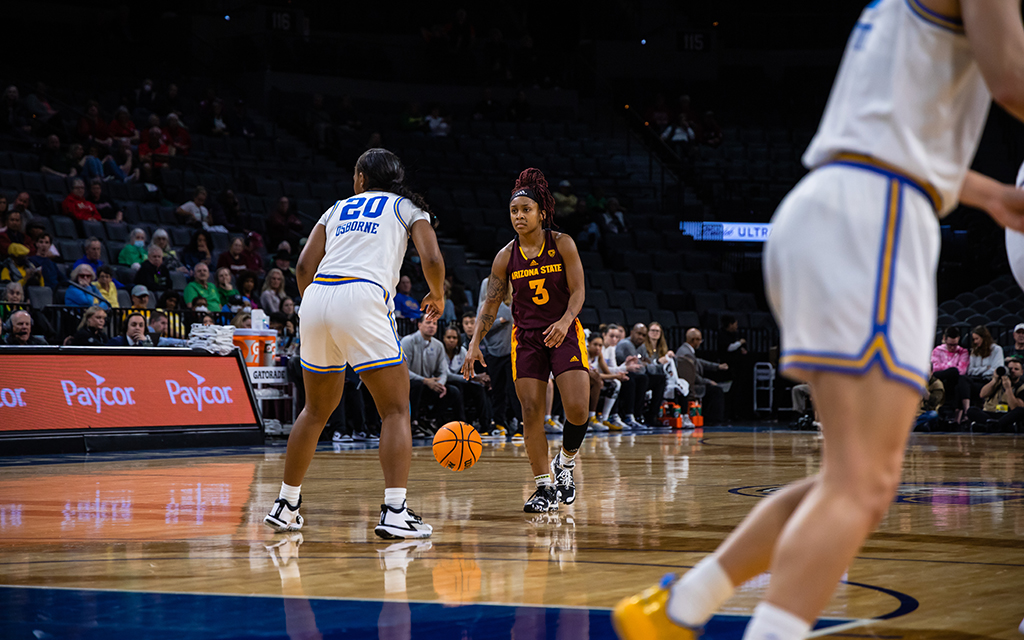LAS VEGAS – The first half of Arizona’s Pac-12 Women’s Basketball Tournament quarterfinal saw the fourth-seeded Wildcats in a competitive game with fifth-seeded UCLA – to no one’s surprise.
However, the second half told the story of larger, recent issues for the Wildcats heading into the NCAA tournament that begins March 15.
UCLA fans took over Michelob ULTRA Arena Thursday and the pro-Arizona crowd went from giddy to grim as the Bruins defeated Arizona 73-59.
The Bruins found success against the Wildcats thanks to 18 points each from senior guard Charisma Osborne and sophomore forward Emily Bessoir.
Arizona, meanwhile, found only minimal success against a tough UCLA interior defense that plugged lanes to the basket and forced bad shot selections. The Wildcats only managed to shoot 13 of 41 from inside the 3-point arc. Jade Loville, Lauren Fields and Shaina Pellington had 10 points apiece for Arizona.
UCLA, however, shot nearly 50% from inside the arc to counter a 5-of-18 deep shooting performance.
The Bruins found their offensive rhythm by outrebounding Arizona 46-27 with 17 offensive rebounds. By the time Arizona began to pick up a significant amount of offensive rebounds in the second half, the Bruins had established firm control inside on both ends.
“The first, second and third key to the game was box out and we couldn’t do them,” Arizona coach Adia Barnes said. “I think that was the biggest difference in the game, but that’s a mentality of focus and a want and we didn’t match their want and their desire to win.”

Arizona coach Adia Barnes watches as her team loses its third straight game. (Photo by Susan Wong/Cronkite News)
At least one Wildcat played fiercely through the Bruins’ hustle and reach. Fifth-year forward Cate Reese did not make a field goal in six attempts, but was by far Arizona’s best rebounder with nine boards including four offensive rebounds. No other Wildcat came down with more than three rebounds.
She also showed effort in fighting for rebounds and loose balls throughout the game, putting her body on the line multiple times.
“I think she did a really good job of sticking with it and trying and giving effort,” Barnes said. “I think sometimes the ball just doesn’t go in the basket, and that’s the game of basketball. I think the good thing is she did other things and she was pretty much the only one that rebounded. … I think that’s a senior, a fifth-year leader, that can do that.”
However, Barnes knows that Reese has to score most often outside of the free throw line, where she went 9 of 10.
“We don’t have an inside presence right now consistently,” Barnes said. “We don’t have someone that we can throw the ball to on the block and score consistently.”
Thursday spoke to larger, recent issues for the Wildcats. Arizona came into the Pac-12 tournament on a two-game losing streak with losses at Oregon and Oregon State.
The Wildcats allowed both teams to shoot well on their home floors with the Ducks and the Beavers shooting 47% and 46%, respectively, against Arizona.
Rebounding was a major issue in Corvallis in particular with Arizona losing the rebounding battle by 22 to Oregon State. Two Beavers recorded at least 10 rebounds as part of a double-double performance against the Wildcats.
Over the last two games, Arizona has been outrebounded 96-55 thanks to two of the Wildcats’ five worst games of the season in allowed rebounds.
The three-game downturn came suddenly after convincing victories against No. 3 Utah and No. 20 Colorado to end Arizona’s home schedule.
Fifth-year guard Pellington, who was one of three leading scorers for Arizona Thursday with 10 points, said she was not sure how her team could not carry over the feeling of beating two ranked opponents at home into a better run of form over the last three games.
“It seems like we’ve just kind of lost touch with that kind of feeling these last couple of games,” Pellington said.
The Wildcats, though, will have an opportunity to turn things around at the NCAA tournament.
Arizona has four wins against teams in the top 25 of NET to anchor a quality resume that earned it security as one of the better teams in the country.
Barnes said no other number from either Thursday or the Oregon road trip can describe the team’s current issues and can stop it from making a big run at the NCAA tournament. Instead, it is all about the willingness to win, especially on defense.
“We’ve always known that we’ve always shown that we’re one of the best defensive teams in the country, and right now we’re not,” Barnes said. “I can’t make you dive for balls. I can tell you that you will lose and you’re not going to win if you don’t do those, but I can’t go play for you, so that’s hard as a coach. I can’t control that.”
What she can control, though, is trying to get the team prepared to be consistent with its effort.
“I have to regroup and be more strategic about things and figure out a way to get us in a better mental space to do it,” Barnes said. “But for me as a coach, it’s really hard to coach this team because I don’t know what team’s going to show up.

The Wildcats’ Jade Loville defends as UCLA guard Kiki Rice brings the ball up the court in Las Vegas. (Photo by Susan Wong/Cronkite News)
“I’ve seen the team that can beat anybody in the country and that’s at home against Utah and Colorado. That’s at Utah. But then I’ve seen the team that doesn’t fight and is not cohesive and that’s Oregon, Oregon State and today against UCLA.”
The good news is some of the Arizona players have witnessed a major March run firsthand after a poor run of form entering the NCAA tournament.
The 2020-21 team took three losses in its last four games before going to the program’s first national championship game as a No. 3 seed.
Pellington, who played a significant role off the bench in the 2021 run to the national title game, said the team will have to figure out how to solve its problems before the NCAA tournament.
“It’s going to come down to just digging deep and figuring out what the root cause of everything is,” Pellington said. “The national championship year, we did the same thing. Just before going into the tournament, we had to dig deep and figure it out. Luckily, we figured it out at the right time. We just all collectively made the decision that we don’t want to lose anymore.”
For that to happen, she said her and her teammates will have to focus strictly on what’s to come.
“We do have many more opportunities ahead of us, but it’s going to take us being present in the moment with one another, not thinking about the future, not thinking about the past and just getting the job done by any means necessary,” Pellington said.



